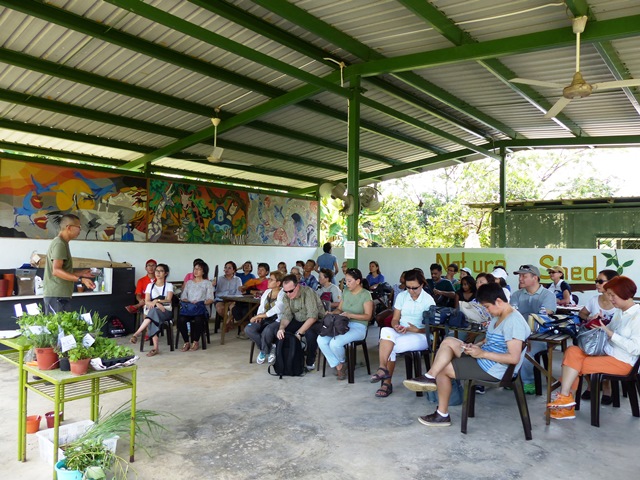Text & Photos by Gloria Seow, Education Committee Chairperson
In a departure from our usual walks on the wild side, the Education Committee organised our first food gardening workshop and farm tour at Bollywood Veggies Farm (located in the Kranji area in the northwestern part of Singapore) on 16 April 2016. Our participant profile took an interesting turn – we had over 30 adults and only one kid. Nature educator Andrew Tay, who is conversant in both plant and animal ecology, was our knowledgeable guide.
In a departure from our usual walks on the wild side, the Education Committee organised our first food gardening workshop and farm tour at Bollywood Veggies Farm (located in the Kranji area in the northwestern part of Singapore) on 16 April 2016. Our participant profile took an interesting turn – we had over 30 adults and only one kid. Nature educator Andrew Tay, who is conversant in both plant and animal ecology, was our knowledgeable guide.
 |
| Bollywood Veggies Farm was a patchwork of fruit and vegetable plots which we saw in our farm tour. |
In our farm tour, Andrew fed us an intriguing fact when we came across a cluster of papaya trees – they were either male or female, identifiable by their flowers. Male trees have showy inflorescences, while females produce individual blooms that as young buds resemble the shape of the fruit (see photos). Only females can produce yummy papayas. That solved the mystery for a few participants, of why some papaya trees never yield fruits. Former Plant Group Chairperson Angie Ng introduced us to the Jambu Bol or Malay Apple, a rarer and tastier cousin of the Jambu Ayer or Water Apple, which some of us sampled. We saw a compost heap with a Cocoyam growing in the middle of it. Composting is a great way to recycle plant waste material. One can create a balanced heap by adding alternate layers of greens (eg. leafy trimmings) and browns (eg. woody prunings). In time, it will all rot down to produce a nutrient-rich compost, serving as a natural fertilizer or soil conditioner.
 |
| Male papaya trees have showy inflorescences (left), while females produce individual blooms that as young buds resemble the shape of the fruit (right). |
Bollywood
cultivates an astounding diversity of plants with multitudinous uses. We found
out that the commonly-seen Moses-in-the-Cradle (aka Oyster Plant), has leaves
that can be boiled as herbal tea to relieve heatiness, and treat a range of
ailments including fever, cough, bronchitis and rheumatism. The farm grows different
banana varieties including the red kind. One participant shared his experience
of peeling a wild banana only to discover it filled with huge seeds and little
flesh. Many were surprised to learn that only modern banana cultivars are
seedless.
 |
| Andrew Tay taught us the basics of growing our own food, shedding light on soils, pots, organic fertilisers, watering and methods of plant propagation. |
We then
proceeded to Bollywood’s open-air shed for the workshop. As an avid gardener,
Andrew revealed that he has a thriving food garden along the corridor of his
flat. We were impressed with the fantastic mix of plants available for us to
bring home – Mint, Sawtooth Coriander, Kang Kong, Rosemary, Lemongrass, Aloe
Vera, Basil, trays of cute baby Bok Choy (Xiao Bai Cai), and many other greens
that came from his own garden, plus cuttings courtesy of Bollywood. Our first
topic was about soil. Andrew had ordered for us a customised blend of clay,
sand and compost, with no added chemical fertilizer, pesticide or fungicide.
For organic fertilizer, we could choose from pellets of sheep dung (baked till
near-odourless) or earthworm poop. Angie was quick to share that the best
fertilizer is free – our own urine, properly diluted of course.
 |
| A fantastic mix of plants available for us to bring home. |
Next, we
learnt that plastic pots retain moisture better, while clay ones allow the
roots to breathe easier. Participants were encouraged to experiment with what
grows best in any combination of pots, locations (outdoors or indoors with morning
sun only), watering and fertilizing frequencies. An interesting segment was
about plant propagation using cuttings, seeds, rhizomes or clump division. Many
vegetables can have their tops cut off with stumps left growing to produce more
leafy shoots for multiple harvests. When greens overgrow, transplanting comes
in. To ensure success, one should partially trim most leaves to reduce the
overall energy burden, and allow the plant to concentrate on forming fresh
roots and shoots in the new location.
It was then
time for us to get our hands in the dirt. We had great fun picking up small
stones to cover the drainage holes of our plastic pot, mixing the soil with a
teaspoon of earthworm poop, and potting up our plant selections. Many brought
home extra plantlets and cuttings wrapped in moist newspaper. Participants were
also given a three-page information sheet that outlined the finer details of
eco-food gardening. We ended with a scrumptious set lunch at Poison Ivy Cafe,
and were entertained by none other than farm owner and stellar storyteller Ivy
Singh-Lim herself. We thank her for the use of her farm venue and nature shed
for free. We are immensely grateful to Andrew for volunteering his time and
effort, and thank Angie Ng, Moira Khaw, Lena Chow, and Timothy Pwee for being
great helpers.
No comments:
Post a Comment